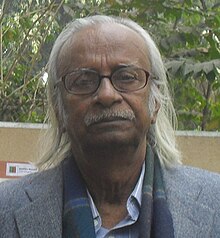Qayyum Chowdhury
Qayyum Chowdhury | |
|---|---|
কাইয়ুম চৌধুরী | |
 Chowdhury in 1960 | |
| Born | 9 March 1932 Feni, Bengal Presidency, British India |
| Died | 30 November 2014 (aged 82) Dhaka, Bangladesh |
| Nationality | Bangladeshi |
| Known for | Painting, book design and illustration |
| Awards | Ekushey Padak (1984) |
Qayyum Chowdhury (9 March 1932 – 30 November 2014)[1][2] was a Bangladeshi painter. Along with Zainul Abedin, Quamrul Hassan and Safiuddin Ahmed, he is considered as a first generation artist of Bangladesh.[3] He was awarded the Ekushey Padak in 1984 and the Independence Day Award in 2014 by the Government of Bangladesh.[4][5]
Early life
[edit]Chowdhury was born on 9 March 1932 in Feni. His father, Abdul Quddus Chowdhury, came from a landlord family and was a cooperative-bank official. Because of transferring job, Chowdhury lived in Chittagong, Comilla, Narail, Sandwip, Noakhali, Feni, Faridpur and Mymensingh in his boyhood.[6] His uncles, Mohtasambillah Chowdhury and Aminul Islam Chowdhury were writers.[7] In 1949, he completed his matriculation from Mymensingh City Collegiate School.[6] He graduated from Dhaka Art College (now Faculty of Fine Arts, University of Dhaka) in 1954.[2]
Career
[edit]
Chowdhury joined Dhaka Art College as a lecturer in 1957.[2] He then took a job at the newly established Design Centre to work under Quamrul Hassan. Within a year he joined the then Pakistan Observer where he served as the chief artist. He also started working for the Observer group's other publications namely Chitrali, a cine magazine and Purbadesh, a news magazine.[7] He went back to Dhaka Art College in 1965.[2] He was promoted to the position of assistant professor in 1970, to associate professor in 1986 and to professor in 1991.[6] He retired from the organization in 1994 but he kept teaching in the institute until 2002.[6]
Works
[edit]Chowdhury's early work include "My Sister" (oil painting, 1954), "Pawnbroker" (oil painting, 1956), "Boat in Moonlight" (watercolor, 1956) and Self-portrait (oil painting, 1959).[6] His later work were "Boat" (pen and ink, 2001), "Setting Sun" (pen and ink, 2001), "Secret Talk" (acrylic, 2004) and "Worried" (acrylic, 2004).[8] He held four solo exhibitions.[9][10]
Chowdhury began designing book covers by working on Zahir Raihan's book "Shesh Bikeler Meye".[2] He designed the cover of Shamsur Rahman (poet)'s first poetry collection, Prothom Gaan Dwityo Mrittyur Agey, and several books of Syed Shamsul Haque.[2]
Chowdhury was a member of Bangladesh Bank's currency note design committee and mural committee and designed several currency notes in circulation.[2]
Chowdhury had been involved with daily Prothom Alo since its inception in 1998.[2] He was the convenor of the Charu Karu Shilpi Songram Parishad during the liberation war in 1971.[11]
Awards
[edit]- First prize for Painting, National Art Exhibition in Lahore (1961)[12]
- The Imperial Court Prize, Tehran Biennale (1966)[12]
- Gold medal for book design from the National Book Centre, Dhaka (1975)[12]
- Shilpakala Academy Award (1977)[12]
- Ekushey Padak (1984)[4]
- 6th Bangabandhu Award (1994)[12]
- Leipzig Book Fair Prize for book illustration (1983)[12]
- Sultan Padak (1999)[12]
Personal life and death
[edit]
In 1960, Chowdhury married Tahera Khanum, (1935–2021) an artist who was one of the first four girls to get admitted to the Art College in 1954.[7] Together they had a son Moinul Islam Zaber.[13]
On 30 November 2014, Chowdhury fell sick while delivering his speech on the fourth-day of Bengal Foundation organized classical music festival in Bangladesh Army Stadium. He had been taken to Combined Military Hospital, where he was declared dead.[2][14]
Documentary on Qayyum Chowdhury
[edit]A documentary film on the life and work of Qayyum Chowdhury was directed and scripted by Fahmida Akhter (as "Fahmida Munni") in 2004 entitled "Nishorger Ankiey" (2004, Ode to Nature : Portrait of an Artist), produced by Bengal Foundation. ,[15][16]
References
[edit]- ^ "Qayyum Chowdhury's 79th birthday celebration". The Daily Star. 11 March 2011. Retrieved 15 November 2017.
- ^ a b c d e f g h i "Painter Qayyum Chowdhury dies after collapsing at classical music fest". bdnews24.com. bdnews24.com. 30 November 2014. Retrieved 30 November 2014.
- ^ "Qayyum Chowdhury". The Daily Star. 26 December 2014. Retrieved 13 November 2017.
- ^ a b একুশে পদকপ্রাপ্ত সুধীবৃন্দ [Ekushey Padak winners list] (in Bengali). Government of Bangladesh. Retrieved 23 August 2017.
- ^ "Independence Day Award" (PDF). Government of Bangladesh. Retrieved 23 September 2016.
- ^ a b c d e "The legacy of Qayyum Chowdhury one year on". The Asian Age Online, Bangladesh. 30 November 2015. Retrieved 14 November 2017.
- ^ a b c "An Artist of Exceptional Versatility". The Star. The Daily Star. 16 April 2010. Retrieved 13 November 2017.
- ^ "An epitaph for Qayyum Chowdhury". The Daily Star. 5 December 2014. Retrieved 13 November 2017.
- ^ "Qayyum Chowdhury Turns 79". The Daily Star. 9 March 2011. Retrieved 15 November 2017.
- ^ "Qayyum Chowdhury exhibition opens today". The Daily Star. 9 March 2012. Retrieved 15 November 2017.
- ^ "Nation grieves Qayyum's death". The Daily Star. 2 December 2014. Retrieved 15 November 2017.
- ^ a b c d e f g "Dhaka Art Center, Qayyum Chowdhury". www.dhakaartcenter.org. Retrieved 5 March 2021.
- ^ "Adieu, Qayyum Chowdhury". The Daily Star. 2 December 2014. Retrieved 13 November 2017.
- ^ "Artist Qayyum Chy passes away". The Daily Star. 30 November 2014. Retrieved 13 November 2017.
- ^ "Nishorger Ankieya (2004) (Part-1) a documentary film on painter Qayyum Chowdhury by Fahmida Munni".
- ^ "Nishorger Ankieya (2004) (Part-2) a documentary film on painter Qayyum Chowdhury by Fahmida Munni".
